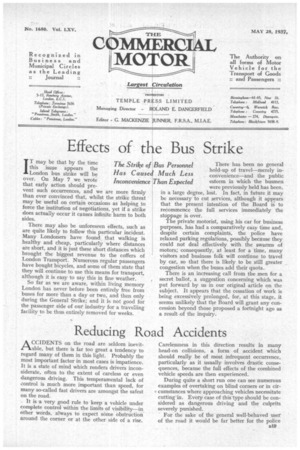Effects of the Bus Strike
Page 33

If you've noticed an error in this article please click here to report it so we can fix it.
IT may be that by the time this issue appears the London bus strike will be over. On May 7 we wrote that early action should prevent such occurrences, and we are more firmly than ever convinced that, whilst the strike threat may be useful on certain occasions as helping to force the institution of negotiations, yet if a strike does actually occur it canses infinite harm to both sides.
There may also be unforeseen effects, such as are quite likely to follow this particular incident. Many Londoners have found that walking is healthy and cheap, particularly where distances are short, and it is just these short distances which brought the biggest revenue to the coffers of London Transport. Numerous regular passengers have bought bicycles, and some of them state that they will continue to use this means for transport, although it is easy to say this in fine weather. So far as we are aware, within living memory London has never before been entirely free from buses for more than a day or two, and then only during the General Strike; and it is not good for the passenger side of our industry for a travelling facility to be thus entirely removed for weeks. There has been no general hold-up of travel—merely inconvenience—and the public esteem in which the busmen were previously held has been, in a large degree, lost. In fact, in future it may be necessary to cut services, although it appears that the present intention of the Board is to recommence the full services immediately the stoppage is over. The private motorist, using his car for business purposes, has had a comparatively easy time and, despite certain complaints, the police have relaxed parking regulations, possibly because they could not deal .effectively with the swarms of motors; consequently, at least for a time, many visitors and business folk will continue to travel by car, so that there is likely to be still greater congestion when the buses add their quota.
There is an increasing call from the men for a secret ballot, a suggestion concerning which was put forward by us in our original article on the subject. It appears that the cessation of work is being excessively prolonged, for, at this stage, it seems unlikely that the Board will grant any concession beyond those proposed a fortnight ago as a result .of the inquiry.




























































































